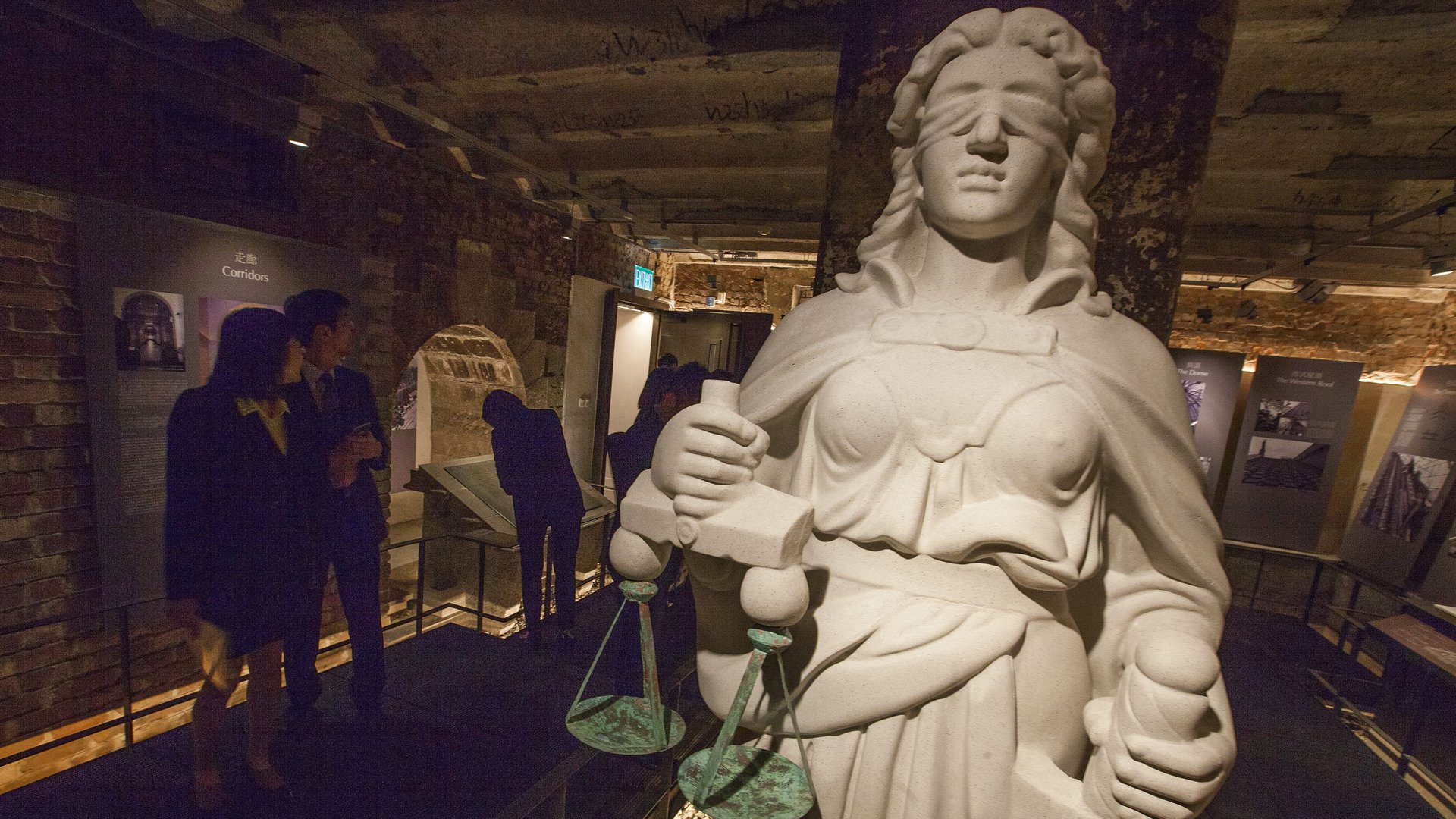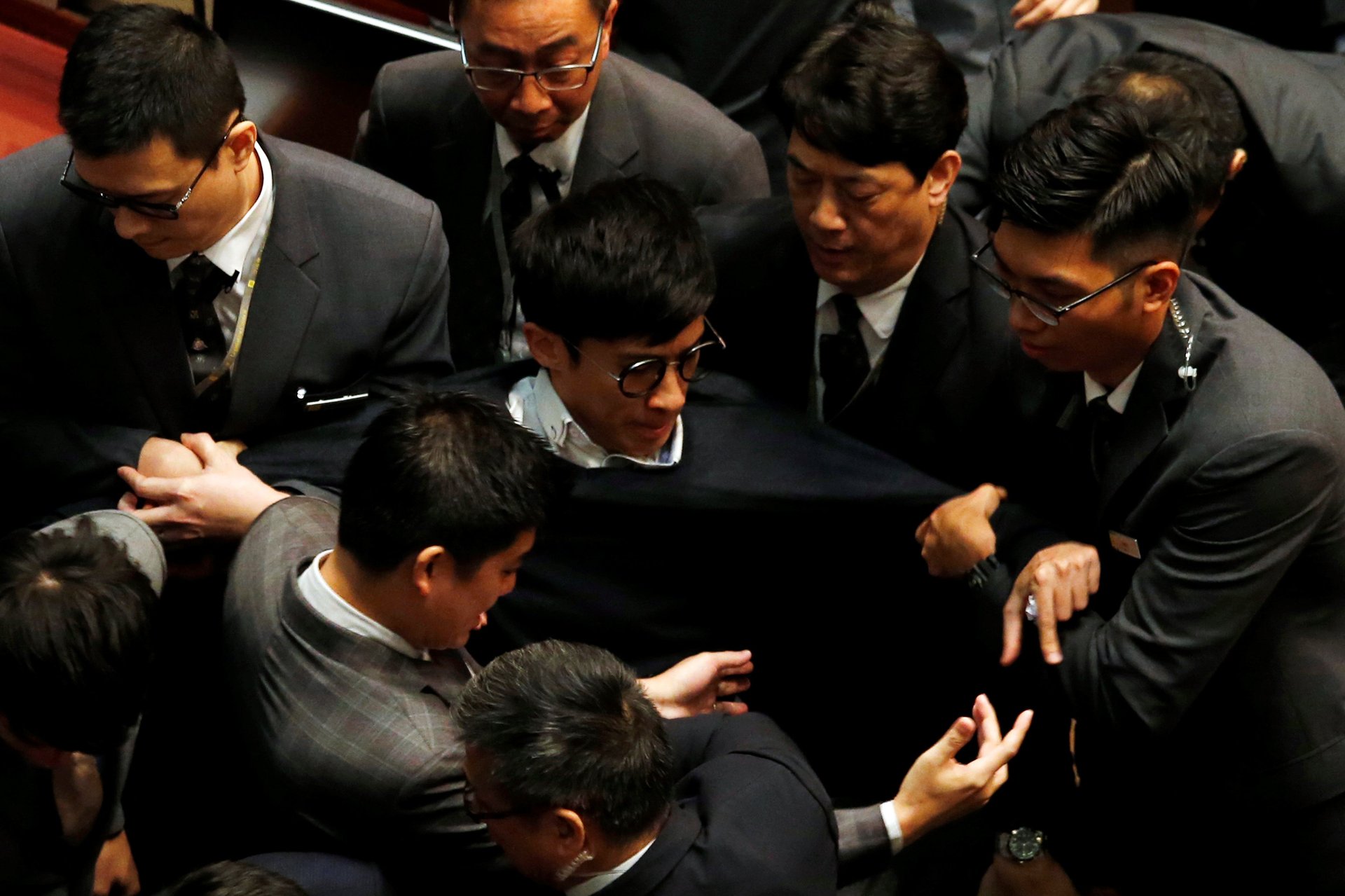This week, Beijing is putting Hong Kong’s judicial independence on the line
As the Hong Kong government takes to the courts to challenge the right of two pro-independence politicians to swear in as lawmakers in the city’s legislature, many are looking to the judiciary as the last line of defense against Beijing’s growing encroachment on Hong Kong’s autonomy.


As the Hong Kong government takes to the courts to challenge the right of two pro-independence politicians to swear in as lawmakers in the city’s legislature, many are looking to the judiciary as the last line of defense against Beijing’s growing encroachment on Hong Kong’s autonomy.
Tomorrow a hearing will begin to decide the fate of two young aspiring politicians, Yau Wai-ching and Baggio Leung, who were elected to the legislature in September elections. The judge in the case, Au Hing-cheung, has practiced law in Hong Kong since 1998, and has nine years of experience as a judge. Hong Kong’s “Basic Law” guarantees the city’s courts the right to “exercise judicial power independently, free from any interference.”
Nonetheless, Hong Kong chief executive Leung Chun-ying has already warned he has not ruled out asking Beijing to interfere as an option. That directly refutes justice secretary Rimsky Yuen saying the matter would be handled by Hong Kong only. The issue was apparently added to the agenda of the Chinese Communist Party’s “sixth plenum” meeting last week, and the mainland’s top legislative body is reportedly meeting Nov. 3 to discuss an interpretation of the Basic Law in response to the hearing.
The situation threatens one of the few pillars of the “One Country, Two Systems” principle—espoused by Chinese leader Deng Xiaoping when the city was handed over from Britain to China—that is still strong. Hong Kong’s executive branch, with the deeply unpopular Leung at its helm, is already considered under Beijing’s control; the legislature’s convoluted voting structure gives an edge to pro-Beijing candidates; local media and academia are threatened by China’s Communist Party, and free speech in the city is under attack.
Right now, the judiciary “remains, for the most part, robustly independent,” said Alvin Cheung, a doctoral student at NYU who previously conducted outsourced prosecutions for Hong Kong’s justice department. But, he said, “the institutional pressures on the judiciary have only been increasing over time, and that trend is unlikely to reverse.”

This week’s case centers around two members of a political party called Youngspiration that was born out of 2014’s pre-democracy Occupy protests. Weeks after they won seats in September’s legislative elections, the two still have not been sworn in as lawmakers. On the first attempt, their oaths were nullified by the Legislative Council (LegCo) president because the two used a racial slur against Chinese people. Their second attempt was then thwarted by an eleventh-hour judicial challenge by the Hong Kong government (followed by a walk-out by pro-Beijing legislators to sabotage the LegCo session). Neither took their oaths in a council meeting held today.
The government’s decision to use the court to interfere in what is seen to be the legislature’s affairs is also problematic. It raises fears that the separation of powers between the three branches of government, also enshrined under the “One Country, Two Systems” principle, is under grave threat. While chief executive Leung had every legal right to use the court in such a way, the decision to do so sets a dangerous precedent, said Kevin Yam, a member of the pro-democracy advocacy group the Progressive Lawyers Group.
“The example I always use in comparison is when during Watergate [US president Richard] Nixon ordered the attorney-general to sack the special prosecutor. He had the legal right to do that, but was it appropriate to do so?” said Yam. “The attorney-general at the time rightly concluded that that was setting a very bad precedent and that it would also impact on future perceptions or actual operations when it came to prosecutorial independence, so he resigned rather than going ahead to carry out a lawful order.”
The Department of Justice said in response to a request for comment:
Any suggestion that the legal proceedings have or will create negative impact on judicial independence or separation of powers is wholly misconceived. The case concerns whether the two LegCo members in question had properly taken the oath as required under the relevant Hong Kong law. Hence, it is a legal question. Such legal question (sic) can only be adjudicated by the Court, not by the LegCo itself.
If Beijing steps in after this week’s hearing, or even before, it will seriously undermine the Hong Kong court system, legal experts say.
According to the Basic Law, the Standing Committee of the National People’s Congress—China’s highest legislative body—has the right to interfere in Hong Kong’s constitutional affairs. It has done so four times since 1997, and sparked a backlash each time. In 1999, for example, when Beijing reinterpreted the law to allow mainland China-born children with a Hong Kong parent to live in the city, the move was met with widespread outrage and protests.
“If people think that no politically important case can actually be litigated in Hong Kong without being kicked upstairs to (Beijing), how likely are they to take Hong Kong courts seriously?” said Cheung.
Hong Kong’s court have heard a number of politically charged cases arising from the Occupy protests and subsequent incidents such as January’s so-called “Fishball Revolution” riots. Yam said that the judiciary has so far done a “fine job.”
“You’re always going to have judges that are more predisposed one way or another, but that’s not a reflection of the quality of the judiciary, nor is it a reflection of it being compromised—you find it in any part of the world,” Yam added.
Even before the most recent events, many in the legal profession had sounded the alarm over the future of their profession. In 2014, lawyers dressed in black marched through the city after Beijing stipulated in a white paper that administrators including lawyers should be patriotic.
“If even academic freedom is being threatened, why would the judiciary remain independent?” retired Hong Kong judge William Waung wrote last year (link in Chinese). “I would say, if you still believe that the independence of the judiciary won’t be eroded, this is a very naive way of thinking.”
This story was updated with a comment from Hong Kong’s Department of Justice.